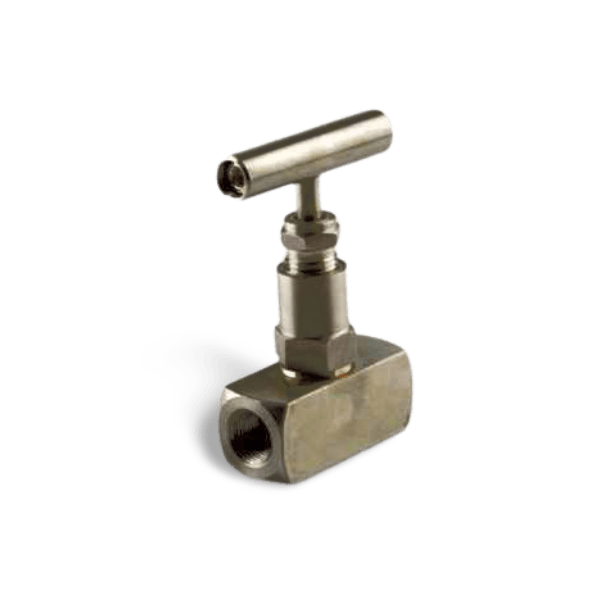Needle Valve Dealer & Supplier
Best Butt Weld Fittings Manufacturer in India since 1971.

Table of Contents
Teshi Group : Leading Manufacturer, Stockist, Supplier, and Exporter of Needle Valve in India.
Teshi Group is a premier manufacturer, stockist, supplier, and exporter of high-quality Needle Valves in India, renowned for their precision control and reliability in managing flow in critical applications. Engineered to deliver fine control of flow rates, Teshi Group’s Needle Valves are ideal for applications requiring precise regulation, such as in instrumentation, laboratory settings, chemical processing, and oil & gas industries. Designed with a small orifice and a fine-threaded stem, these valves provide accurate flow adjustments, allowing for gradual and smooth fluid control even at high pressures. Teshi Group’s Needle Valves are manufactured using superior materials and state-of-the-art technology, ensuring robustness, durability, and resistance to corrosion, even in harsh environments. Adhering to stringent international standards, Teshi Group’s Needle Valves are known for their leak-tight performance, ease of maintenance, and extended service life. With a commitment to quality, innovation, and customer satisfaction, Teshi Group provides both standard and custom-engineered needle valve solutions, tailored to meet the specific needs of industries around the globe. Their dedication to excellence makes Teshi Group a trusted partner for clients seeking reliable, high-performance needle valves that deliver precise flow control under demanding conditions.
About Needle Valve :-
A Needle Valve is a precision valve used to accurately control the flow rate of fluids or gases in a pipeline, particularly in applications requiring fine adjustments. It features a slender, tapered needle-like plunger, or “stem,” that fits into a matching seat within the valve body. By turning the valve handle, the needle is gradually raised or lowered, allowing for very precise control of the fluid or gas flow through a small orifice. This enables needle valves to offer exceptional control over flow rate, pressure, and direction.
Needle valves are typically made from materials such as stainless steel, brass, and various alloys to provide high durability and resistance to corrosion, pressure, and temperature. These valves are widely used in industries like oil and gas, chemical processing, instrumentation, and hydraulic systems, where precision flow control is essential. They are particularly common in metering applications, laboratory setups, and systems with low flow rates or high-pressure conditions.
One of the primary advantages of needle valves is their ability to achieve a tight, leak-free shutoff, even under high pressure. The fine threading of the stem and the tapered shape of the needle allow for gradual and precise adjustments, making them ideal for applications requiring controlled flow rates, such as in sampling lines, fuel lines, or pressure gauges. However, needle valves are generally not recommended for frequent on-off operations, as their fine-threading mechanism is best suited for gradual adjustments rather than rapid opening and closing. With their reliability, precision, and excellent control characteristics, needle valves are highly valued components in many industrial and laboratory applications.
Teshi Group is an ISO certified Needle Valve manufacturer & distributor in India.
Plug Valve Specification, Grades & Material
Fittings |
Specification |
|---|---|
Valve Types |
The Pinch Valve, Pressure Relief Valve, Plug Valve, Needle Valve, Gate Valve, Butterfly Valve, Check Valve, Ball Valve, Globe valve |
Schedule |
SCH5, SCH10, SCH20, SCH30, SCH40, STD, SCH80, XS, SCH60, SCH80, SCH120,SCH140, SCH160, XXS |
Standard |
ASME/ANSI B16.11, MSS-SP-97, MSS-SP-79, JIS B2316, BS 3799 |
Size |
1/8″NB to 24″NB & 1/4″OD TO 24″OD AND 6.35mm to 254mm OD Thickness: 0.6mm to 20mm |
Type |
Welded, threaded, BW, SW. |
Fittings |
Grade |
|---|---|
Stainless Steel |
ASTM /ASME A/SA 213 / 249 / 269 / 312 / 358 CL. I to V – 304 , 304L , 304H, 309S ,309H , 310S, 310H , 316 , 316TI , 316H , 316 LN , 317 , 317L , 321 , 321H , 347 , 347 H , 904L . |
Duplex Steel |
ASTM/ASME A/SA 789, 790 – UNS NO S 31803, S 32205, S 32550, S 32750, S 32760. |
Carbon Steel |
ASTM A106 Gr. A, B & C API 5L Gr. A / B, X42 ,X52 ,X60 ASTM A 53 Gr. A/B |
Alloys Steel |
ASTM /ASME A/SA 213 / 335 / 691 – P5,P9,P11,P12,P22,P91 |
Nickel Alloys |
Nickel Alloys 200, Nickel Alloys 201 |
Hastelloy |
Hastelloy C-22, Hastelloy C-276, Hastelloy C-2000, Hastelloy C-4, Hastelloy X, Hastelloy B, Hastelloy N, Hastelloy G |
Inconel |
Inconel 600, Inconel 601, Inconel 625, Inconel 625LCF, Inconel 686, Inconel 718, Inconel 800, Inconel 825, Inconel X-750 , Inconel 690, Inconel 602, Inconel 617, Inconel 925, Inconel A-289, Inconel AL-6XN, AL-904L |
Teshi Group Is A Leading Suppliers of Needle Valve
We supply Needle Valve to Agra, Ahmedabad, Ajmer, Aligarh, Allahabad, Ambattur, Amravati, Amritsar, Asansol, Aurangabad, Bangalore, Bareilly, Belgaum, Bhavnagar, Bhilai Nagar, Bhiwandi, Bhopal, Bhubaneswar, Bikaner, Chandigarh, Chennai, Coimbatore, Cuttack, Dehradun, Delhi, Dhanbad, Durgapur, Faridabad, Firozabad, Gaya, Ghaziabad, Gorakhpur, Gulbarga, Guntur, Gurgaon, Guwahati, Gwalior, Haora, Hubli and Dharwad, Hyderabad, Indore, Jabalpur, Jaipur, Jalandhar, Jalgaon, Jammu, Jamnagar, Jamshedpur, Jhansi, Jodhpur, Kalyan & Dombivali, Kanpur, Karnataka, Kochi, Kolapur, Kolkata, Kota, Loni, Lucknow, Ludhiana, Madurai, Maheshtala, Malegoan, Mangalore, Meerut, Mira, Bhayander, Moradabad, Mumbai, Nagpur,Nanded Waghala, Nashik, Navi Mumbai, Nellore, Noida, Patna, Pimpri & Chinchwad, Pune, Raipur, Rajkot, Ranchi, Saharanpur, Salem, Sangli Miraj Kupwad, Siliguri, Solapur, Srinagar, Surat, Thane, Thiruvananthapuram, Tiruchirappalli, Tirunelveli, Udaipur, Ujjain, Ulhasnagar, Vadodara, Varanasi, Vasai Virar, Vijayawada, Visakhapatnam, Warangal.
Needle Valve Exporter To All Major Cities In The World
We export Needle Valve to Seoul, Hanoi, Los Angeles, Rio de, Houston, York, Dammam, Al-Khobar, Bogota, Al-Jubail, Chiyoda, Abu Dhabi, Kuwait Santiago, Perth, Busan, London, Jakarta, Surat, Courbevoie, Dallas, Calgary, Mexico Muscat, Aberdeen, City, Edmonton, Riyadh, Caracas, Ahvaz, Brisbane, Moscow, Milan, Manama, Ulsan, Jaya, Granada, Vung Petaling, Melbourne, Montreal, Port-of-Spain, La Victoria, Istanbul, Janeiro, Karachi, New Singapore, Madrid, Lagos, Atyrau, Sydney, Kuala Dubai, City, Bangkok, Toronto, Gimhae-si, Lumpur, Jeddah, Pimpri-Chinchwad, Tehran, Doha, Ho-Chi-Minh-City, Algiers, Tau, Colombo, Ernakulam, Geoje-si, Cairo, Sharjah, Lahore.
Teshi exports Needle Valve in more than 50 countries. We have shipments going out monthly to different countries for our newly acquired customers. Our ready stock of Flanges helps us ship the Flange and meet the requirement and demands of our customers as fast as possible.
We Export Needle Valve to United States (USA), Canada, Germany, Japan, France, Middle-East, Bangladesh, Nepal etc.
Product
Export
Frequently Asked Questions
Most frequent questions and answers
What is a needle valve?
A needle valve is a type of valve with a slender, tapered point at the end of a valve stem, allowing precise regulation of fluid flow. It’s commonly used when fine control over flow rate is required.
How does a needle valve work?
A needle valve works by rotating the handle to move a threaded stem up or down. The tapered needle fits into a small seat, gradually opening or closing the passageway to control flow with high precision.
What are the main uses of needle valves?
Needle valves are primarily used in applications requiring precise flow control, such as metering gases or liquids, pressure testing, chemical dosing, instrumentation, and fuel regulation in engines or pipelines.
What industries use needle valves?
Needle valves are used in industries that require controlled flow, such as chemical processing, pharmaceuticals, oil and gas, water treatment, and automotive industries.
Can needle valves handle high pressure?
Yes, needle valves are suitable for high-pressure applications. They are often designed with materials like stainless steel or brass to withstand elevated pressures, depending on the model.
What materials are needle valves made from?
Needle valves are commonly made from stainless steel, brass, carbon steel, or PVC, depending on the application requirements. For corrosive environments, stainless steel or special alloy valves are preferred.
How does a needle valve differ from a ball valve?
While needle valves are used for precise flow regulation, ball valves are typically used for simple on/off control without fine adjustment. Needle valves are ideal when exact control over flow rate is essential.
Are needle valves suitable for throttling?
Yes, needle valves are specifically designed for throttling and regulating flow with precision. The design allows incremental adjustments, making them ideal for controlled flow in sensitive applications.
What is the maximum temperature a needle valve can handle?
The temperature tolerance of needle valves depends on the material. Stainless steel needle valves, for example, can typically withstand temperatures up to 400°F (204°C) or higher. Always consult manufacturer specifications for exact ratings.
Are needle valves reliable for preventing leaks?
Yes, needle valves provide excellent leak-tight sealing due to the close fit between the needle and seat, which is especially beneficial in high-pressure applications and where contamination prevention is essential.
Can needle valves control both liquid and gas flow?
Yes, needle valves are effective for both liquid and gas flow control. Their precise design allows them to handle various media with a high level of accuracy and reliability.
How do you install a needle valve?
To install a needle valve, ensure proper alignment with flow direction, use suitable fittings or adapters, and follow manufacturer recommendations for tightening. Proper installation prevents leaks and ensures stable flow control.
What maintenance is required for needle valves?
Needle valves require periodic inspection to check for wear or damage on the needle and seat. Cleaning and recalibration may also be necessary to maintain precise control over flow rate.
Can needle valves be automated?
Some needle valves can be automated using pneumatic or electric actuators. Automation is beneficial in applications that require remote or frequent adjustments for flow control.
How do needle valves contribute to system efficiency?
By providing precise control over flow rate, needle valves improve system efficiency by ensuring the right amount of fluid or gas flows at the right pressure, which reduces waste and optimizes performance.
What is a miniature needle valve?
A miniature needle valve is a compact version of a standard needle valve, designed for small systems or applications where space is limited, yet precise flow control is still necessary.
Can needle valves be used in hazardous environments?
Yes, when made from appropriate materials (like stainless steel or corrosion-resistant alloys), needle valves are safe for use in hazardous environments, such as chemical processing or oil and gas systems.
Are needle valves suitable for vacuum applications?
Yes, needle valves are suitable for vacuum applications and provide excellent control over gas flow in low-pressure systems, making them useful in labs and certain industrial applications.
What is the difference between a needle valve and a globe valve?
Both needle and globe valves regulate flow, but needle valves provide finer control due to the tapered stem. Globe valves handle larger flows and are more commonly used for on/off control and throttling with less precision.
What are the pressure ratings for needle valves?
The pressure rating of a needle valve varies based on material and design but can range from 500 to 10,000 PSI or more. High-pressure needle valves are specifically engineered for demanding applications.
Can needle valves be used for high-viscosity fluids?
Needle valves are generally better suited for low to medium-viscosity fluids. High-viscosity fluids may not pass easily through the small orifice, potentially affecting flow control accuracy.
How do you determine the right orifice size for a needle valve?
Choosing the correct orifice size depends on desired flow rate, pressure, and fluid characteristics. Larger orifices are better for higher flow rates, while smaller ones provide finer control over lower flow rates.
What is an angle needle valve?
An angle needle valve changes the direction of flow by 90 degrees, making it suitable for applications where space constraints or specific flow configurations require an angled pathway.
Are there high-temperature needle valves?
Yes, high-temperature needle valves are designed to withstand extreme temperatures and are typically made from materials like stainless steel or other high-temperature alloys for durability in hot conditions.


